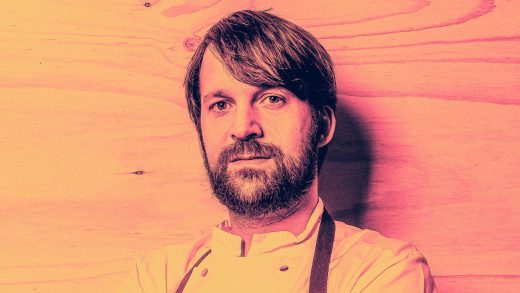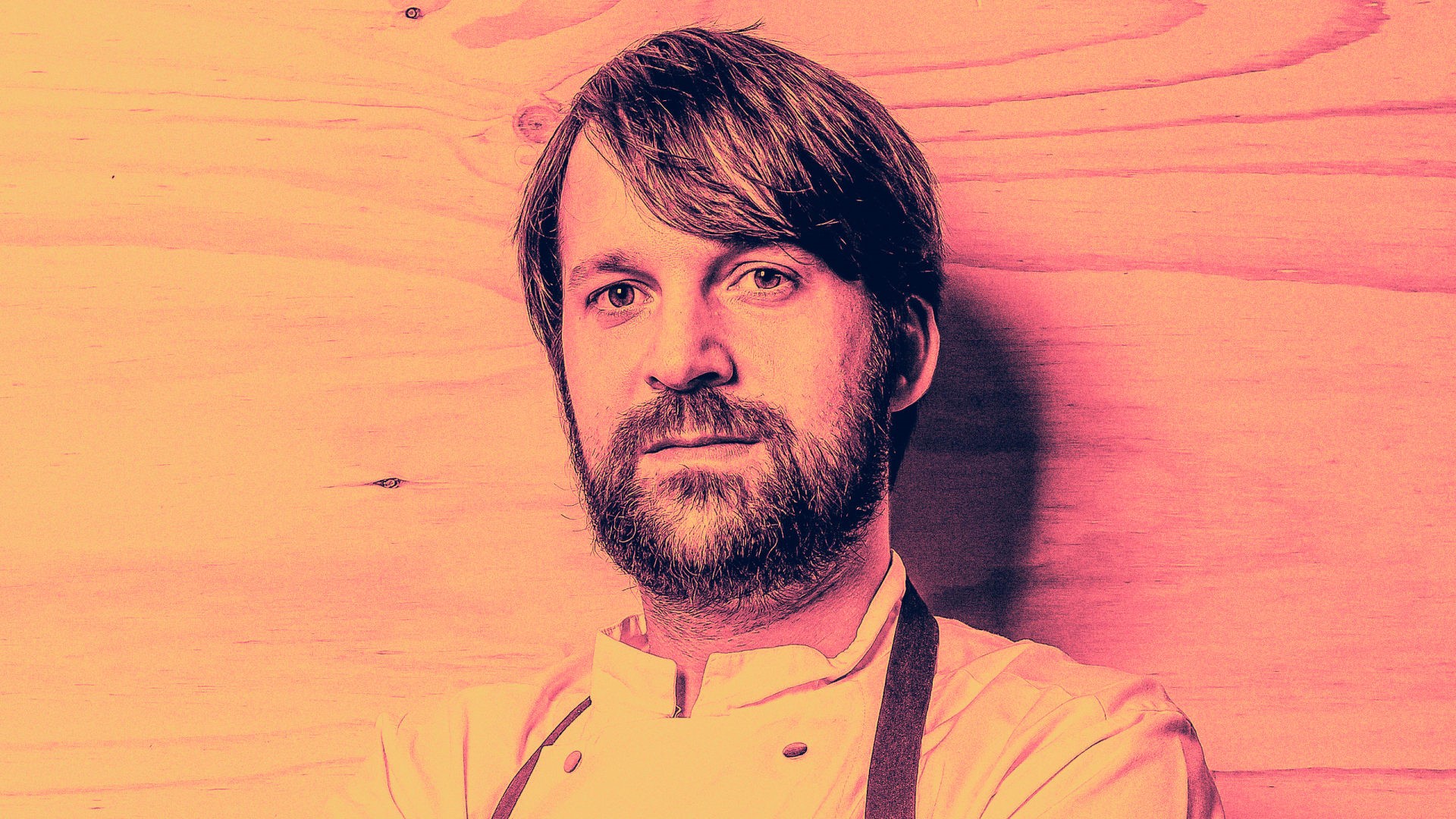René Redzepi talks life after Noma and his new show, ‘Omnivore’
René Redzepi talks life after Noma and his new show, ‘Omnivore’
With a new Apple TV+ show and a burgeoning consumer goods business, in Noma’s last year René Redzepi is making it more than a restaurant.
BY Yasmin Gagne
Since he opened it in 2003, René Redzepi’s Copenhagen restaurant, Noma, repeatedly earned a spot on the list of the World’s 50 Best Restaurants. Then, in January, he decided to close the doors of the three-Michelin-starred enterprise. Now he’s trying to redefine the very concept of a fine dining restaurant, and reach more foodies through his new show, Omnivore, which debuted July 19 on Apple TV+.
Omnivore, which he describes as a mix of Anthony Bourdain’s Parts Unknown and Planet Earth, tells the story of common ingredients like corn and tuna, placing them in a historical, cultural, and environmental context across 16 countries.
Once Noma closes at the end of this year, Redzepi will be taking his restaurant—where a meal typically costs around $500—on the road as part of a pop-up series he calls Noma 3.0. Starting in Tokyo, Noma 3.0 will be selling more accessibly priced goods and condiments that the team has created in their labs (think mushroom garum, or vinegar made from crushed wild rose petals, starting at $25).
Redzepi joined Fast Company associate editor Yasmin Gagne on the Most Innovative Companies podcast. He discussed redefining fine dining, taking inspiration from Bourdain, and how he feels when foodies film him at work.
You’ve described Omnivore as a mix between Parts Unknown and Planet Earth. How did you come up with the concept for the show?
When Noma was getting known around the world, I was actually being offered TV jobs probably once a month. One of them I remember was called Fire and Ice. The idea was that I had to go out and cook with celebrities in cold areas in Scandinavia, and use fire to do it. That never became anything. My favorite childhood TV hero was David Attenborough. I would dream away as a child watching him lift a tiny leaf [to look at] a beetle under it. Fast-forward 10 years, I meet Matt Goulding, who’s the cocreator of Omnivore. He used to produce Anthony Bourdain’s show and worked with him for a long time. Anyone who’s doing food TV stands on Anthony Bourdain’s shoulders. I wanted that commitment to quality and to interesting stories, but at the same time, I’m not the main protagonist. I’m not a host, but rather a guide.
A lot of Omnivore is focused on sustainability, and it’s something that you’ve championed at Noma. How did you build that into the narrative?
There are plenty of shows and there is plenty of information out there that tells you what not to do. That sort of almost shames you. We knew from the get-go, that’s not how we want to approach things. It’s not us telling anyone what to do. It’s inspiring people to actually look at the world differently after they’ve seen this show.
It’s unrealistic to tell people “Next week all of you stop everything that you hold dear because you’ve been doing [things] wrong.” I think actually it pushes people into the opposite way of thinking. I eat meat and we also eat meat at the restaurant as a team, but 50% of days are actually meatless. Researching and doing the show kind of further enhanced that notion that if we plan it well and we cook well for ourselves, we can actually eat vegetables that taste as good as a roast chicken. But once in a while to get roast chicken is also magnificent.
Omnivore is debuting as Noma is closing. What does the next phase of the restaurant look like?
We’ve been open for just about 21 years. We have experienced incredible success. It was clear that the way we’re operating, the level of attention we have to everyday production as a restaurant was not sustainable. We are changing as a team. We’re growing up; everyone around us is having kids. We need to grow as an organization. I could see that if we were doing restaurant work and opening every night, we’d probably slowly burn ourselves out, and the creativity would spill out. And what I actually like about my work is the creation of things. So we’ve envisioned this new plan where restaurant work in the future is where we have fun—it’s going to be like our hobby. But of course, that meant we would lose our revenue. So building that new financial platform is at the center of Noma 3.0, so that we can be creatively free.
How are you going to make money now?
We have a fermentation lab, and we have hundreds of items that I feel like we’ve invented. So we thought, let’s see if we can bring that into people’s homes. We started Noma Projects, and there are now more than 50 different products, from umami paste to oils and all sorts of things that can help you cook better. We’re hoping that will be the foundation of the platform. In the future, we’ll also collaborate with other food startups, or with universities to actually participate in food in a bigger way than just serving 40 to 50 people a night. So there might be other business ventures coming beyond just our own product lines.
Do you think it’s possible to run a sustainable fine dining restaurant and turn a profit?
I shouldn’t say it isn’t. It’s very difficult. Maybe there’s someone out there doing it. I think we’ll be able to do it. If our plan works, then we’re going to be able to have one of the strongest, most resilient organizations with a financial platform that is rock solid, and we’re going to be able to have an organization that can just thrive. That’s the goal.
I’ve got to ask you about your favorite food-related TV shows and movies. Beyond Parts Unknown, who or what has inspired you?
I’m not sure anyone here in America knows Keith Floyd. He was a crazy Englishman who used to drink wine and travel the world. He always had the right comment full of knowledge. He spoke in a slightly sarcastic but friendly way. Incredible television. In terms of movies, there are so many. I like Tampopo, Big Night . . .
What did you think of The Menu?
I haven’t watched it. Everyone asks me, so I’ve decided I’m never going to watch it because as soon as it came up, we’d have guests at the restaurant saying, “Oh, did you watch The Menu?” They say that it’s because it was supposedly inspired by all these Scandinavian restaurants. Also, so often when there is something food related, they always make a little fun of it, which is kind of annoying as a food person. We are struggling hard enough, now you got to make a movie making fun of everything?
Do you think making fun of foodies is fair game?
I feel that I’m very young, but I still remember the first time I went to a table and someone filmed me as I was explaining the dish. I remember going back into the kitchen and feeling so violated. This person is filming me without my consent. Today, most of the time I will be explaining to a table and people will be filming and not really watching me. They’ll just be watching their screen.
You made a cameo appearance on The Bear this season. What did you think of the show?
I haven’t watched the full show. I only watched some episodes. We know the people from The Bear, and I actually think they’re doing something for the industry. They’re giving some opportunity and some attention to the industry. But in terms of watching it as an industry person myself, it’s a little too stressful for me. Imagine coming home from work and then watching it and feeling like you’re at work again, but it’s always the worst day ever at work. In reality, kitchens are not that crazy.
Do you like having a fine dining experience yourself?
I love to eat and I love food and I love to cook and I do fine dining experiences, but to me this idea of fine dining versus, let’s say, a brassy food or a hot dog cart, is a false dichotomy, because if you are a hot dog cart owner and you are wanting to do the best that you can, it takes the same level of commitment. Maybe five times a year I’d do a meal that is a theatrical production. Most of the time I try to go to mom-and-pop shops or family-owned restaurants where they really take care and they serve you every day. That’s most of the restaurant industry.
ABOUT THE AUTHOR
(15)



